Every day, you write blog posts, send tweets, and upload videos to YouTube, among many other marketing tasks.
You create all this content, but that's not enough to paint a full picture. What do these activities contribute to the business's bottom line? Without proving their marketing ROI, it's almost impossible to justify your marketing budget.
Unsurprisingly, companies want hard numbers about marketing's contribution. In fact, in a survey, 93% of CMOs agreed that they're under pressure to deliver measurable ROI.
Now, how do you access the analytics you need to measure your online marketing ROI effectively? You need the right tools. This article highlights five tools that provide insights into your marketing results and how they tie to revenue.
But before we get into each tool in detail, how do you calculate your marketing ROI?
- First, you start by setting marketing objectives for each campaign
- Then, you identify and name the KPIs that you will be using to monitor the success of the campaign, based on your objectives
- Third, assign values to your KPIs to help you measure your results correctly
- And as the results start to come in, you can use this basic formula to calculate your marketing ROI:
ROI = (Gains from investment - cost of investment) / (cost of investment) × 100
1. Google Analytics
Even though Google Analytics is a free tool already used by most marketers, very few dive deep enough into the metrics. Put simply, you can use Google Analytics to track the results of marketing campaigns on your website.
For instance, you can track your traffic sources and see how visitors from each source behave on your website. Another important feature is Behavior Flow, which displays how visitors navigate the pages of your website.
Google Analytics also helps you find hard numbers like leads and purchases through goal tracking. Go to the admin section, click "Goals," and create your new goal.

Depending on what constitutes a conversion for your business, you can select any of these goal templates:
- Revenue
- Acquisition
- Inquiry
- Engagement
- Custom
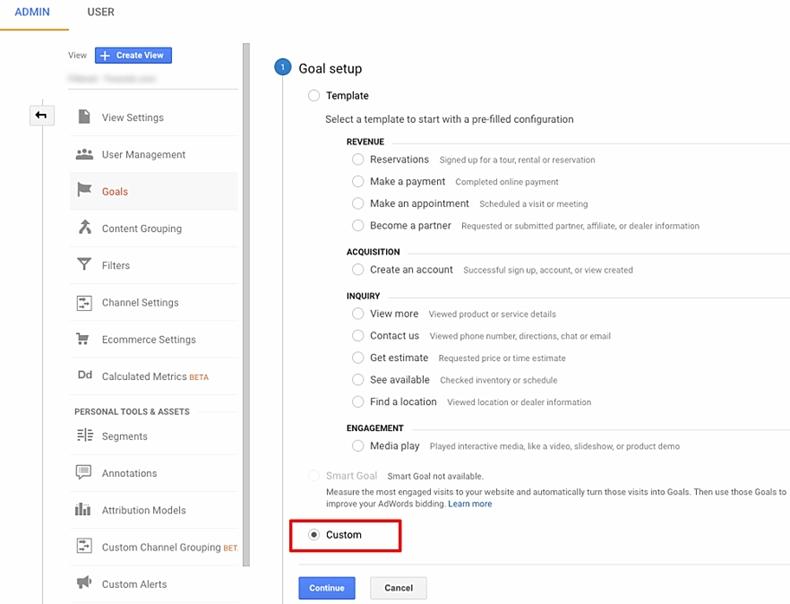
If you go for the custom option, you'll need to choose from goal types, such as destination, duration, pages/screens per session, and event.
For instance, if you want to track lead acquisition on your website, you'll have to enter the destination URL and the value of your goal. Here, a thank-you page for the campaign can track leads acquired during the campaign:
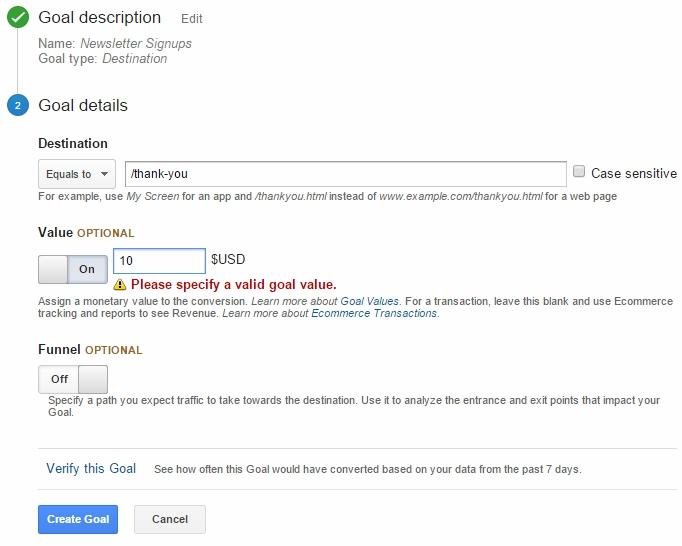
With Google Analytics, you can capture details that prove the results of your marketing campaigns, including the traffic and conversions generated.
2. CANDDi
One way to measure your marketing ROI is to get details about visitors to your website and the actions they take while browsing your pages. Fortunately, CANDDi provides important visitor metrics that help to measure your ROI.
First, you'll find details such as these:
- Name
- Location
- Number of visits
- Time on site
- Number of activities
- Name of company/employer
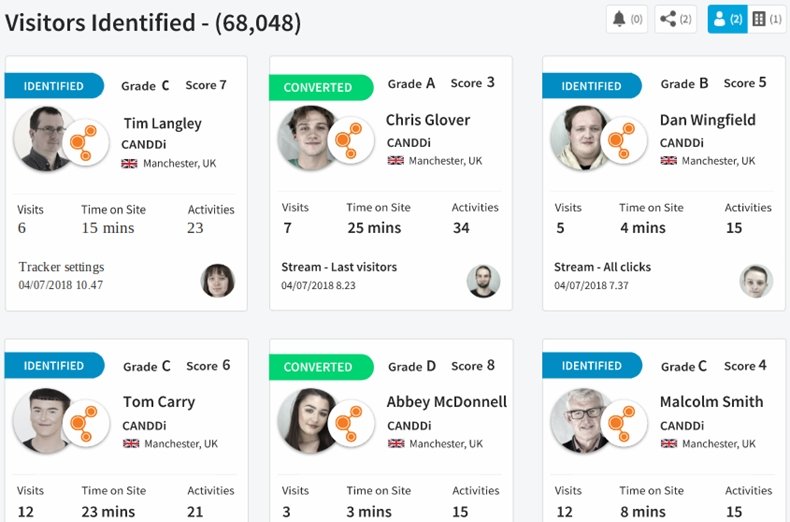
In addition, you can group visitors according to the companies they work for. For instance, do you have multiple visitors from the same company looking at your product specification page?
You can also see more details about specific visitors, including pages they've visited and the referral pages.
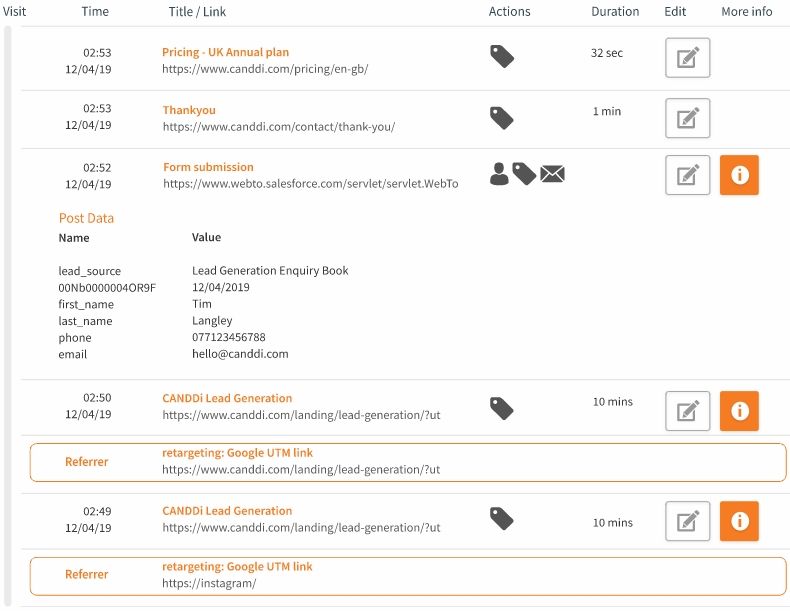
That way, you can, for example, discover whether a social media campaign was responsible for a visitor who made a purchase as their seventh activity on your website.
Furthermore, CANNDi Capture forms help you to capture leads on your website. You can see the number of leads captured and calculate your ROI.
With CANDDi's ability to track visitors and their actions, you can effectively link marketing campaigns to leads and sales—arguably one of the most difficult tasks a marketer has to face on a regular basis.
3. Mixpanel
What events occur on your website? That is a question Mixpanel can answer effectively. As an analytics tool, it helps track events on your website and provides insights into those events.
Among its many features, Mixpanel lets you see a detailed user profile: You'll find details about the pages they viewed and their path to conversion. Thus, you can easily attribute the right marketing campaign to their conversion.

You also have cohorts analysis, which allows you to analyze users based on their acquisition source. That can reveal the best acquisition source for your business.
With the conversion rate flow feature, it becomes easier to analyze your conversion rates and how they vary according to various criteria. Furthermore, you can see the referrers responsible for your conversions. Another option is to check for the top paths that lead to conversions.
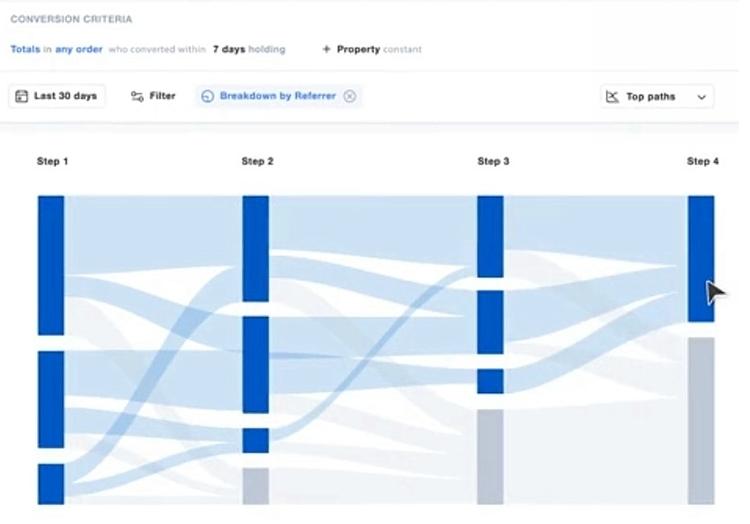
As a result, you can effectively identify the marketing campaigns responsible for conversions and improve your marketing efforts in future campaigns. Also, Mixpanel allows you to build your dashboards with important KPIs for your business.
If you want clients to receive regular reports, you can schedule reports at intervals. Likewise, you can set up custom alerts when important metrics get a sudden change.
Overall, Mixpanel helps you to set up your KPIs, provide reports, and show the campaigns responsible for your conversions.
4. Cyfe
This is an all-in-one marketing analytics tool that can help you track different marketing campaigns across channels. To that end, you can add widgets for various purposes, such as these:
- Advertising
- Web analytics
- Blogging
- Sales & Finance
- Social media
- SEO
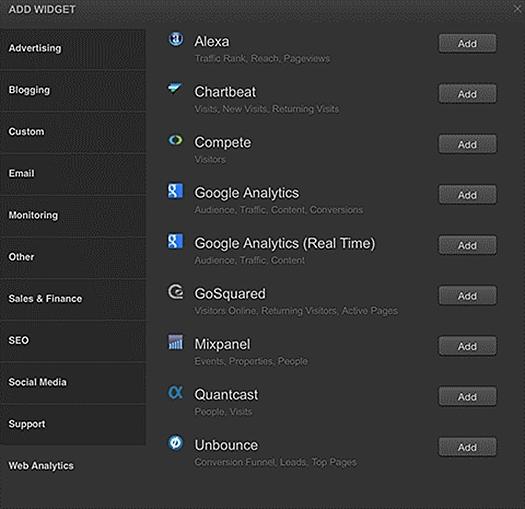
Apart from those widgets, there are pre-built integrations with a large number of marketing tools, such as social media platforms, Google Analytics, email marketing, and so on. Luckily, Cyfe allows you to create your marketing ROI dashboard.
Depending on your KPIs, you can build a customized ROI dashboard for your business. If you want to create and send the marketing ROI reports to your clients, Cyfe's whitelabel capabilities will help to create professional reports.
Furthermore, you have the option to schedule your reports so that clients can receive them at regular intervals. With Cyfe, you can measure your marketing ROI no matter the channel.
5. Finteza
With Finteza, you have a Web analytics tool that provides details about the traffic on your website and the actions visitors take. You'll get details such as location, device, organization, and more.
You can also track traffic quality to see the portion of clean traffic. Another important feature is the ability to track traffic sources to your website. To investigate each referral source further, just click on the referral source.
What actions represent conversions? The events feature allows you to define those actions and track how many times they occur. In the conversions tab, you can see the number of conversions on your website and the traffic sources responsible for them. Furthermore, you can click on each traffic source and get more details about its conversions.
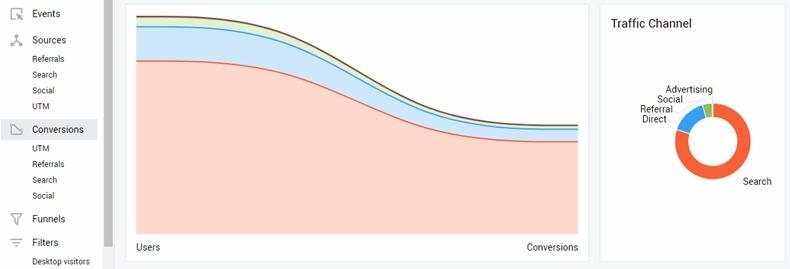
You also have the option to create conversion funnels for different marketing campaigns and get details about those funnels.
Conclusion
Measuring your marketing ROI provides insights into how well your marketing campaigns are contributing to a business. Moreover, you can then optimize performance in your future marketing campaigns.
Explore these five tools, and you'll have no problem justifying the impact of your hard work as a marketer.




